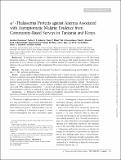| dc.contributor.author | Jacobien Veenemans, Pauline EA Andang'o, Erasto V Mbugi, Rob J Kraaijenhagen, David L Mwaniki, Frank P Mockenhaupt, Susanne Roewer, Raimos M Olomi, John F Shao, Jos WM van der Meer, Huub FJ Savelkoul, Hans Verhoef | |
| dc.date.accessioned | 2020-08-17T07:56:59Z | |
| dc.date.available | 2020-08-17T07:56:59Z | |
| dc.date.issued | 2008-08-01 | |
| dc.identifier.uri | https://repository.maseno.ac.ke/handle/123456789/2141 | |
| dc.description.abstract | Background. In hospital-based studies, α+-thalassemia has been found to protect against severe, life-threatening falciparum malaria. α+-Thalassemia does not seem to prevent infection or high parasite densities but rather limits progression to severe disease—in particular, severe malarial anemia. We assessed to what extent α+-thalassemia influences the association between mild, asymptomatic Plasmodium falciparum infection and hemoglobin concentration.
Methods. The study was based on 2 community-based surveys conducted among afebrile children (0.5–8 years old; n=801) in Kenya and Tanzania.
Results. Among children without inflammation (whole-blood C-reactive protein concentration ≤10 mg/L), P. falciparum infection was associated with only small reductions in hemoglobin concentration, and effects were similar across α … | en_US |
| dc.publisher | The University of Chicago Press | en_US |
| dc.subject | Cell Biology and Immunology Group and 2 Division of Human Nutrition, Wageningen University, Wageningen, 3 Meander Medical Centre, Amersfoort, and 4 University Medical Centre Nijmegen, Nijmegen, The Netherlands; 5 Institute of Tropical Medicine and International Health, Charité–University Medicine Berlin, Berlin, Germany; 6 Kenyan Institute of Medical Research, Nairobi, Kenya; 7 Kilimanjaro Christian Medical Centre, Moshi, Tanzania | en_US |
| dc.title | α+-Thalassemia Protects against Anemia Associated with Asymptomatic Malaria: Evidence from Community-Based Surveys in Tanzania and Kenya | en_US |
| dc.type | Article | en_US |

